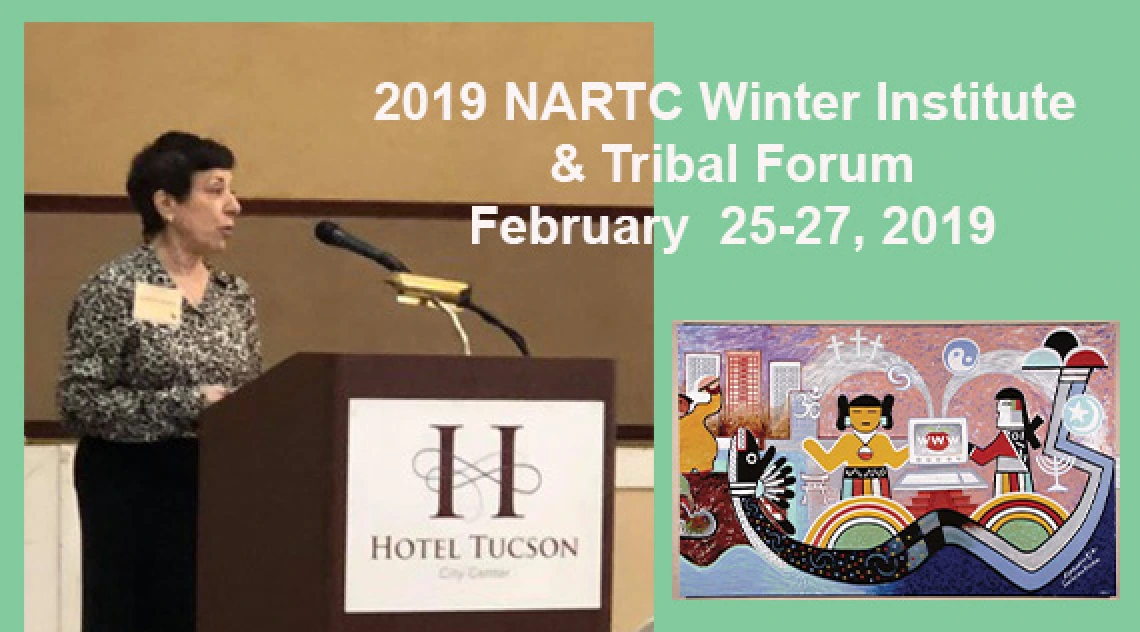2019 NARTC Winter Institute and Tribal Forum

 The 2019 Winter Institute and Tribal Forum “Convergence and Divergence in Native Health Research” took place in Tucson, Arizona on February 25-27 combining two annual meetings by the Native American Research and Training Center (NARTC) and the Southwest Environmental Health Science Center. The Superfund Research Center Community Engagement Core was a major partner and sponsor for this meeting. The Winter Institute meeting was focused on the confluence of traditional and contemporary medicine. The Tribal Forum was focused on disaster response and research on Tribal Lands. These events shared successful resolution of community issues related to environmental disasters to build capacity to respond to long-term and immediate environmental impacts on human health and our environment.
The 2019 Winter Institute and Tribal Forum “Convergence and Divergence in Native Health Research” took place in Tucson, Arizona on February 25-27 combining two annual meetings by the Native American Research and Training Center (NARTC) and the Southwest Environmental Health Science Center. The Superfund Research Center Community Engagement Core was a major partner and sponsor for this meeting. The Winter Institute meeting was focused on the confluence of traditional and contemporary medicine. The Tribal Forum was focused on disaster response and research on Tribal Lands. These events shared successful resolution of community issues related to environmental disasters to build capacity to respond to long-term and immediate environmental impacts on human health and our environment.
 We were honored to have Dr. Linda Birnbaum, Director of the National Institute of Environmental Health Sciences (NIEHS), attend and provide a greeting and remarks discussing the importance of disaster response and research. She especially highlighted the 2015 Gold King Mine Spill and the concerted effort of UA to address the consequences including the UA SRP, the UA Southwest Environmental Health sciences Center, and the UA Center for Indigenous Environmental Health Research.
We were honored to have Dr. Linda Birnbaum, Director of the National Institute of Environmental Health Sciences (NIEHS), attend and provide a greeting and remarks discussing the importance of disaster response and research. She especially highlighted the 2015 Gold King Mine Spill and the concerted effort of UA to address the consequences including the UA SRP, the UA Southwest Environmental Health sciences Center, and the UA Center for Indigenous Environmental Health Research.
 UA SRP Community Engagement Core Director, Dr. Karletta Chief participated in both forums. On the second day, Superfund CEC convened a session “Topics on Environmental Health” featuring the Superfund’s effort on the Gold King Mine Diné Exposure Project and CIEHR’s work with the Hopi Environmental Health Project. On the last day, Dr. Chief participating in the panel on “Stories of Disasters in Tribal Communities in Arizona.” Dr. Chief co-presented with her tribal community partner Chili Yazzie, President of the Shiprock Chapter on the Navajo Nation. They co-presented on the Navajo response to the Gold King Mine Spill and the short term environmental health impacts and emphasized the importance of community engagement, incorporation of traditional knowledge and Diné (or Navajo) epistemologies in addressing this environmental disaster and the resiliency of the Diné community.
UA SRP Community Engagement Core Director, Dr. Karletta Chief participated in both forums. On the second day, Superfund CEC convened a session “Topics on Environmental Health” featuring the Superfund’s effort on the Gold King Mine Diné Exposure Project and CIEHR’s work with the Hopi Environmental Health Project. On the last day, Dr. Chief participating in the panel on “Stories of Disasters in Tribal Communities in Arizona.” Dr. Chief co-presented with her tribal community partner Chili Yazzie, President of the Shiprock Chapter on the Navajo Nation. They co-presented on the Navajo response to the Gold King Mine Spill and the short term environmental health impacts and emphasized the importance of community engagement, incorporation of traditional knowledge and Diné (or Navajo) epistemologies in addressing this environmental disaster and the resiliency of the Diné community.
This session showcased how UA has deep engagement with Tribes and has worked to build trust, collect environmental data in the context of cultural concerns.

